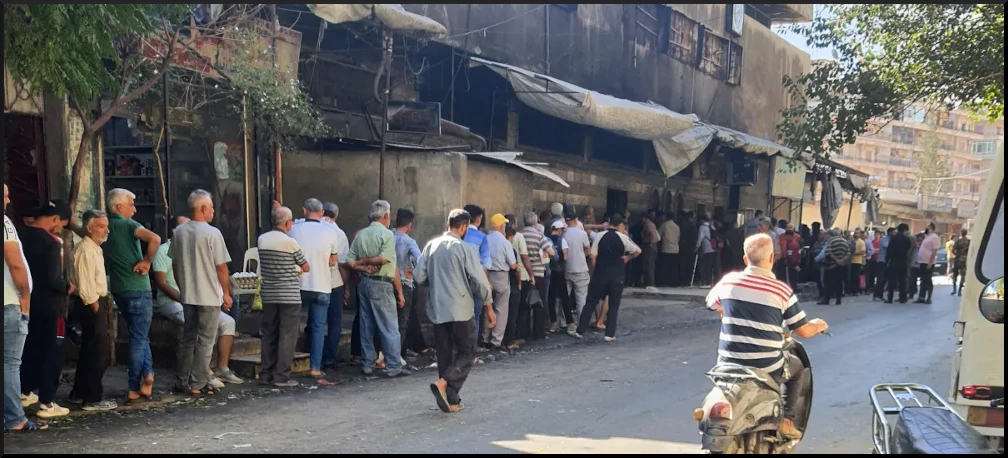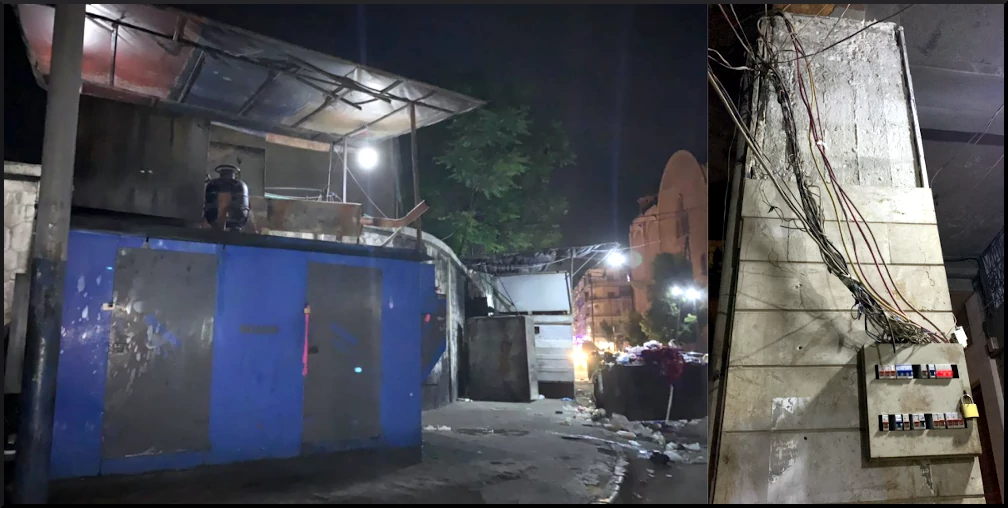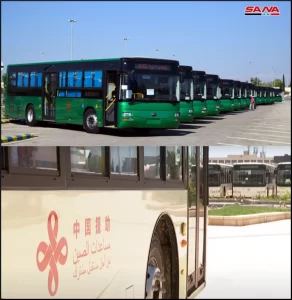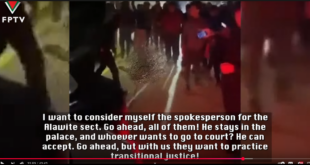by Hekmat Aboukhater, published on The Grayzone, May 16, 2023
Syrian-American journalist Hekmat Aboukhater traveled across Homs, Lattakia, Tartous, and Aleppo this April, reporting for The Grayzone on the devastating impact of Western economic sanctions on average Syrians.
Throughout 2023, a series of anti-Syrian refugee bills, a failing economy, and anti-Syrian rhetoric have deepened the plight of the two million Syrian refugees living in Lebanon. Hate crimes against Syrians suspected of living in the country illegally have skyrocketed, while at least 130 refugees have been deported.
Weekly Israeli strikes have kept both the Aleppo and Damascus airports perpetually out of service, preventing much-needed aid shipments from entering the country. Syrians living abroad and hoping to return home must therefore face Lebanese customs once they land in the Middle East.
Any Syrian hoping to visit Syria for something as simple as a wedding or a funeral, as I did this April, is likely to be subjected to a hostile interaction by Lebanese customs officials. The officers usually demand to know why any Syrian is entering Lebanon, and how and when they will leave. Once out of the airport, the Syrian national is forced to take a $150 taxi ride into Syria.
The dignity and privilege afforded to Italians landing in Fiumicino airport for Easter holidays, and to Americans landing in Logan airport for Thanksgiving, is not afforded to a Syrian returning home for Eid al-Fitr. And once they are home, they must navigate life in an economy that has been intentionally suffocated by Western sanctions.
US sanctions obliterate average Syrians’ savings
The Syrian Pound has deteriorated so far in value that 1 dollar now exchanges to 8,700 SYP. While the exchange rate was 1 to 40 before the war, the country’s currency began its downward spiral following the authorization by US Congress of the so-called Caesar Act sanctions bill which came into effect in 2019. With the stroke of a presidential pen, the savings of millions of Syrians was decimated over the course of a few months.
Nowadays, the average Syrian who pays for everyday goods and services must carry absurdly inconvenient amounts of cash in the form of wads stuffed in satchels and fanny packs. If that Syrian wishes to pay for something more valuable—say, monthly rent—then they need black plastic bags worth of Syrian Liras and hundreds of rubber bands.
Payments pertaining to legal settlements and real estate purchases, on the other hand, can sometimes be paid through discrete means with dollars and Euros.
To help offset the impact of inflation on average Syrians, the government has established a smart card registry that offers subsidized rations of food items, cooking gas, and vehicle fuel among other items, on a bi-weekly rotation. The government has complemented this subsidy system by offering direct payments of 150,000 SYP or $19 to government employees, families of Syrian army veterans killed in action, and retirees.

Given that a November 2022 UN report found that 90% of the Syrian population is now “suffocating” below the poverty line, these government measures, while helpful, are simply unable to meet the overwhelming needs of an immiserated Syrian population.
US military occupation starves Syria of oil and wheat
One way the Syrian government could tackle rampant inflation is by making use of its natural resources, yet this simple solution faces a severe obstacle: the US military.
The US military currently maintains a presence of about 1,000 personnel strategically situated in the resource-rich eastern third of Syria. While on paper Deir Ezzor, Hasakah, and Al-Raqqah are under the control of the Syrian Democratic Forces (SDF), or the Kurdish YPG forces, they are in fact occupied in violation of international law by the US military.

For the last 5 years, US forces have been documented stealing thousands of oil tankers and wheat trucks from Syria and illegally crossing the border into Iraq and Turkey. The US then sells Syrian oil in order to fund its proxy forces and military operations throughout the region.
Before the eight-year-long dirty war waged on Syria by Western and Gulf states, which saw billions of dollars of weapons and gear placed in the hands of armed groups determined to wrest control of the government, Syria was an economically self-sufficient country. The northeastern regions of Hasakah and Deir Ezzor that were besieged by jihadist gangs like ISIS, then occupied by the US military, once comprised Syria’s bread basket. Following almost a decade of destabilization, Syria relies heavily on grain exported from Ukraine, now the site of the most serious European land war since World War Two. With global food supplies disrupted, Syrians suffer immensely from acute food shortages.
Due to fuel shortages, government-provided electricity is available for only a total of 4 hours a day in Homs, Lattakia, Damascus, Aleppo, and Tartous (usually 2 hours in the early morning and 2 hours in the evening). While large cities like Aleppo, Lattakia, and Damascus have employed massive neighborhood generators (or Ampere units) to keep the lights on, the overwhelming majority of the country plunges into darkness throughout much of the day.

During my visit to Aleppo in early May, I found myself in a taxi that suddenly ran out of fuel. The taxi driver had already used his allotted ration of fuel afforded to him through the smart card, and was forced to beg a fellow driver to siphon off a liter of fuel in a plastic bottle so he could complete my ride.
While the Syrian people have been systematically starved of electricity and their own natural resources, they feel further humiliated when they see convoys of fuel tankers with Deir Ezzor license plates on their way to the fuel refinery in Baniyas in the coastal governorate of Tartus. These tankers are carrying Syrian oil that represents their national patrimony, but which is being extracted and sold back to Syria by US-backed forces in Deir Ezzor.
“These oil tankers travel hundreds of miles from the oil wells of Deir Ezzor to the refinery in Baniyas only to turn around and deliver to the Syrian governorates… What a shame,” stated Bassam, a family friend and driver, as we traveled from Homs to Tartus.
After years of war, Israeli strikes rain down on Syrian cities
When strolling about the streets of any Syria city, or taking a bus across governorates in the country, it is hard not to wince at the sight of Syrian Arab Army (SAA) veterans. During my visit to Homs, I shared a bus ride with a disabled SAA veteran who could not get down a curb without help. During the ride, the veteran explained how the war shattered his life and career prospects. He explained that during his service he lost many of his brothers in arms to ISIS, Al Nusra, and rebel groups during the Western and Gulf-backed dirty war of 2012 and 2019. Yet the loss that grieved him most happened more recently: He lost a close comrade in one of the hundreds of Israeli strikes that rained down on the nation in 2022.
Last week, I visited Damascus, Syria.
About 1 month before my visit (and 2 weeks after an earthquake devastated Syria), Israel launched strikes on civilian areas of Damascus that killed at least 15 persons, including 2 women.
One site that was hit was the Citadel in the old… pic.twitter.com/bXq64bo2BE
— Dimitri Lascaris (@dimitrilascaris) March 27, 2023
Now, the men who survived the war to rid their country of ISIS and Al Nusra are dying at the hands of Israeli pilots flying American jets. “We didn’t only save and protect Syria in this war… We also saved those living in America and Europe by making sure that the jihadists died here. And this is how they repay us,” the dejected veteran remarked to me.
Over the course of the past decade, the West and its Gulf allies transformed Syria into a funnel for the worst of humanity. Yet the Syrian Army cleared that funnel of death for the French who supported the so-called moderate rebels, for the English who sponsored intelligence operations in Syria, and for the Americans who joined the fight on the side of ISIS and Jabhat Al-Nusra.

Online education blocked by US sanctions
Peter Jabbour is a 19-year-old Syrian student who wakes up at 4:30 AM because the lights in his room have just come on. He enjoys about two hours of government-provided electricity, rushes out of bed to charge his electronic devices and finish homework on his computer. He then tries to log onto his Coursera account to complete a programming course but is blocked. He attempts a similar course on Udemy, but is also blocked. He realizes that his VPN is no longer working. His IP address reads: Syria. The might of the US sanctions regime has come crashing down on this young student in his room.
In the eyes of Washington, Peter is not worthy of being a digital student like his peers around the world simply because Peter is Syrian and is living in Aleppo, a territory controlled by the Syrian government.
As average Syrian youths try to improve their lot with the limited resources afforded to them in their country, they are inevitably relegated to second class citizen in the digital world. They are blocked from accessing the most basic online tools required to participate in the global economy. Random and byzantine OFAC and Caesar Act sanctions rules have prevented Syrian students from accessing Zoom, Slack, Skillshare, Udemy, Coursera, Code Academy, and even everyday tools such as the Apple Store.
Last September, while in Syria, my sister tried to take the National Board of Medical Examiners assessment, but was blocked by the software because she was located inside Syria. Why is a medical exam included in the list of sanctions against a country? This is one question among many for which Syrians will never find answers from their besiegers.
Syrian civil society attempts to bounce back
As Syrian civil society struggles to recover from the dirty war and innovates on a daily basis to survive, cultural institutions have seen a noticeable resurgence as citizens begin to frequent concerts and performances once again.
While in Aleppo, I had the opportunity to attend two concerts in the historic Citadel of Aleppo and a performance in the Maronite Cathedral of Saint Elijah. The number of attendees was impressive and the sense of engagement during the shows was palpable.

It was a clear sign of the resilience that has been on display for the world to see since the start of the war in 2011, and the start of the economic war in 2019. The people of Syria seem to have understood that their country is a cog in a game played by mighty nations. And they clearly recognize that this game is only won with a far-sighted perspective.
Considering the recent Chinese-brokered peace deal between Saudi Arabia and Iran, the launch of Russian-brokered Syrian-Turkish talks, and the readmittance of Syria into the Arab League, Syrians are beginning to see a glimmer of light at the end of the tunnel.
Throughout the four governorates I visited, and throughout all the conversations I had with fellow Syrians, a word I constantly heard was “هانت,” or “hanet.” It is an Arabic expression that roughly translates to “our suffering is almost over.”
 Syria Support Movement solidarity with the Syrian people
Syria Support Movement solidarity with the Syrian people





